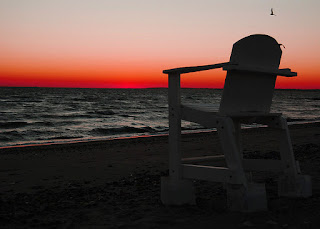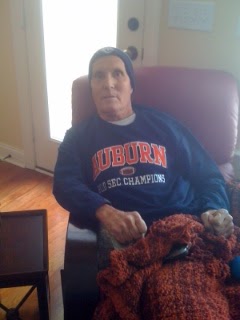Continued from Part 34
On the second day of Dad’s second hospitalization, Dad’s nose and cheeks looked red and swollen, but his neck was a little less swollen, his pain was better controlled, and he was coughing less with the medicine and breathing treatments he had received.
When the oncologist came by for rounds that morning, he said that he expected “to see a neurological improvement as the infection started to clear,” which he expected would happen "soon, given the spectrum of antibiotics being administered." He said that he was ordering an MRI for that afternoon and that we should plan for Dad to be in the hospital through the weekend, which meant we would be there on Christmas Day.
We continued taking turns staying with Dad, with two of us there at a time. For most of the day, he was chatty, but, as my sister noted in the Notebook, his words were “mumbly,” presumably because of how weak he was and possibly linked to the pain medications being administered. He had taken in very few calories over the past few days, but he kept saying that he wasn’t hungry and he got annoyed when one of us asked him if he would try to eat or drink something.
Late that afternoon after the MRI, he requested and finished off some chicken soup, some ice cream, and a Diet Coke, and a few hours later he ate some mashed potatoes and baked apples. Each bite he ate gave me a little more hope that he would pull through the raging infection, of which we were still waiting to learn the source.
Nurse Meredith, aka Angie, was with us again for the 7 p.m. to 7 a.m. night shift that second night. She and Dad chatted about how much she liked her job and, when she told him that she was from Bowling Green, Kentucky, about how great Corvettes were. When she commented that she thought he was doing much better than the night before, he nonchalantly said, “Yeah, I was supposed to die last night, but I didn’t so I know I am going to get better.” We exchanged looks over his head and hoped silently that his prediction was correct.
Some Christmas carolers came by and stood in the hallway just outside the door to our room singing, which got a big smile from Dad. By bedtime that night, he reported that he didn’t have any pain except for his throat and the bedsore hurting, the latter for which a special air mattress had been brought in for him.
My sister J and I stayed with Dad that night. Not long after we had turned the lights off in hopes that it would help him sleep, he got a really frightened look on his face and started gasping for breath. His heart rate shot up; we called for Meredith, who sprinted down the hall to check on Dad but couldn’t figure out what was going on. Over and over, Dad told us that he was freezing, and then he started saying things that we didn’t quite understand. Despite the temperature of the room being warm and several blankets being placed over him in the bed, his teeth were chattering so much that we had to strain to understand him. “I think I’m dead,” he told the three of us, “and I’m starting to wonder if y’all are dead too.”
We assured him that all of us including him were ok, but he insisted that the reason he was so cold was that he was dead and that he thought we were cold too since we were also dead. “Is this what it’s like when you’re dead?” he asked. “I don’t want it to be cold!”
And then he said something even more puzzling: “I see Hattie, Mattie, and little Sally over there – are they cold, too?”
Wanting so much to help him, we looked at each other with wide, scared eyes. The three of us were almost lying on top of him trying to warm him up and to calm him down. After hearing him repeat the list of those three names a few times, it dawned on me that he was naming three dogs that had died years ago, and he was convinced that he could see them. Realizing that neither verbal nor physical comfort measures were not going to be effective in battling the panic and the terror, Meredith raced to get a sedative for Dad, and, five minutes later, he was resting soundly.
Afterwards, Meredith went back to the nurses’ station, and my sister and I sat in the dark room and watched him sleep. We didn’t know what to make of the episode or what had caused it to happen. Dad slept for several hours, but we didn’t – the terror he had been experiencing had been transferred to us.
The oncologist made his rounds before the sun was up on Thursday morning; he brought with him the news that, although slightly improved, Dad’s blood counts were still dangerously low and thus he would be getting a transfusion later in the day. Unlike his previous proclamation (which I had written down word-for-word in the Notebook) about Dad getting “exponentially better,” he said that recovery for Dad was going to be a roller-coaster ride, with improvements and regressions along the way, especially while we waited on the blood count to come back up.
And then came the big news: the results of the previous day’s MRI. Dr. O said that the tumor’s size was "about the same" as a month ago. Given the extreme aggressiveness of the nature of GBM, that was considered to be very good news; the fact that the tumor hadn't grown was a sign that the treatment was working. In even better news, fewer "areas of enhancement" had shown up on the MRI. which indicated there were fewer blood vessels going to (or "feeding") the tumor.
“That is exactly the goal of Avastin,” Dr. O proclaimed, but then he went on to say that Dad would have to continue to stay in the hospital until his blood count improved and that it was too soon to predict the timing for the next dose of Avastin/chemo because that was dependent on the blood count. He told us that he would be off-duty for the three-day holiday weekend but that another oncologist in his practice, Dr. M, would take over in his absence. Dr. O listed his goals for Dad for over the long weekend as having an improved blood count, eating more, requiring less pain medication, and getting up in a chair.
“Just hold on until after the transfusion, and you’ll have more energy,” he said. As he turned to leave the room, Dad, who was so exhausted that he had kept his eyes closed during the entire interaction, piped up with a cheery “Will do, Doc! Thanks for coming by!”
Right after the doctor left, a physical therapist came by, and, with the help of a staff member named Dave whom my sister and I thought was a nurse, she and I helped Dad sit on the side of the bed, which was scary and totally exhausting for him. Dad said he felt like he was going to fall, and, despite reassurances from all of us, he held on to our arms with a white-knuckled grip. Just moving from one position to another was a MAJOR effort for him, but, with his “no-pain-no-gain expression” on his face, he did it for about three minutes before he had to lie back on the bed to rest.
When Meredith’s shift had ended at 7:00 that morning, a nurse named Leah had been assigned to Dad, but for some reason there was a change in staff late that morning. Leah, although not warm or friendly like Meredith, had seemed efficient; the new nurse Jessica had started off acting just short of what I considered rude. Of course, it was one thing for someone who was supposed to be taking care of Dad to be brusque with me, my sisters, or our mom, but it was an entirely different story when that impertinence was imposed on Dad.
Helpful Dave brought ice chips, warm blankets, and Diet Coke for Dad throughout the morning. Dad, of course, thanked Dave but didn’t notice Jessica’s bitchiness behavior, but we did, and, after several snippy comments from her and a few long delays in responding to fairly simple requests that directly related to the provision of patient care, I told the nursing supervisor that I didn’t think it was a good “match.”
“We’re short staffed,” she informed me, as if that made the level of care acceptable.
“What about Dave, the nurse who has been helping the other nurses all day?” I asked.
“Dave is our unit secretary,” she told me curtly. “Really all I can do is for me myself to provide back up for Jessica as needed for the rest of this shift.” Um, ok then.
Lunchtime brought some chicken soup for Dad, which he ate with assistance, and also a follow-up visit from the Infectious Disease doctor, who informed us that two “bugs” had been identified in Dad’s blood samples, both of which are typically found on the skin or in the mouth or digestive system of people but which, in a person like Dad with a compromised immune system, can go haywire and result in an infection anywhere in the body, most commonly in the lungs (pneumonia), in the urinary tract, in a wound, or in the throat. The Infectious Disease doctor said that Dad could have infections in any or all of these and that the source was probably his own body.
Wow, I thought, we have put so much effort into sterilizing everything around him and limiting his contact with the outside world for fear that he would get sick, but the problem actually came from within his own body. I wasn’t quite sure what to do with that information except to feel even more powerless against what was going on; despite our best efforts, the protective shield that I thought we had put up around him was eroding a little at a time.
Up Next … Part 36 – ICU 2.0




























